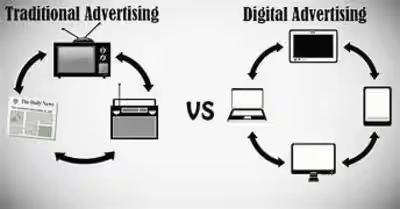Digital Advertising: A shift from traditional advertising or an…
Ever sat through a TV ad and thought, "Why am I even watching this?" Or flipped through a magazine, skipping past pages of ads that didn’t interest you? If so, you’ve experienced firsthand the limitations of traditional advertising.
Then came digital advertising—the world where ads follow you around the internet, remind you of things you once searched for and somehow predict what you might like next. It’s like having a personal shopping assistant, but sometimes, it can feel a little too personal.
But here’s the real question: Is digital advertising a complete shift from traditional advertising, or is it just an improvement on the same old game?
Traditional Advertising: What It Did Right
Before the internet changed everything, brands relied on billboards, TV, radio, newspapers, and magazines to get their message across. These platforms worked, but they weren’t always efficient.
Massive Reach – A single TV or radio ad could be seen or heard by millions. Think Super Bowl commercials that get the whole world talking.
Tangible Influence – A well-placed billboard or a newspaper ad could leave a lasting impression.
Trust Factor – People trusted brands they saw on TV, in newspapers, or on the radio because these platforms felt more credible.
But here’s the problem—traditional advertising was expensive, hard to track, and often irrelevant to a large percentage of the audience. Imagine spending millions on a billboard only for it to be ignored by most of your target customers.
Enter Digital Advertising: Smarter, More Data-Driven
Digital advertising didn’t just replace traditional advertising—it made it better. Instead of throwing ads at everyone, digital platforms let brands target the right people, at the right time, in the right place.
Better Targeting – Instead of hoping the right people see an ad, digital platforms use data to show ads to people based on their interests, search history, and even location.
Cost-Effective – Running a Google or social media campaign is often cheaper than a TV commercial, and you can track every dollar spent.
Measurable Results – Digital advertising provides real-time analytics, so brands can see how many people clicked, engaged, or bought something.
Personalisation – Ever searched for sneakers, only to see sneaker ads everywhere? That’s digital advertising, making sure ads are tailored to what you want.
But, just like traditional ads, digital ads have their downsides too.
Ad Fatigue – People see too many ads online and start ignoring them altogether.
Privacy Concerns – Many people don’t like ads "following" them everywhere. With growing privacy concerns, brands need to be more transparent about data use.
Fierce Competition – Since every business can run ads online, standing out is harder than ever.
So, Is Digital Advertising a Shift or an Improvement?
The truth? It’s both.
Digital advertising builds on traditional advertising but adds precision, efficiency, and measurability. Instead of replacing TV, radio, or billboards entirely, it enhances how brands connect with audiences.
That being said, traditional advertising still works in some industries. Some brands still invest in TV, radio, and billboards because they know their audience still engages with these platforms.
Conclusion
Advertising has come a long way—from generic TV ads to contextual digital experiences. While digital advertising is data-driven, interactive, and cost-effective, traditional advertising still carries credibility and trust that digital ads sometimes struggle with.
Rather than choosing between the two, the best approach is knowing when to use what. Some audiences respond better to billboards and TV, while others engage more with social media and Google ads.
What do you think? Is digital advertising completely replacing traditional ads, or is it just a smarter evolution?
Like this project
Posted Mar 29, 2025
Ever sat through a TV ad and thought, "Why am I even watching this?" Or flipped through a magazine, skipping past pages of ads that didn’t interest you?
Likes
0
Views
1
Timeline
Feb 7, 2025 - Feb 9, 2025




